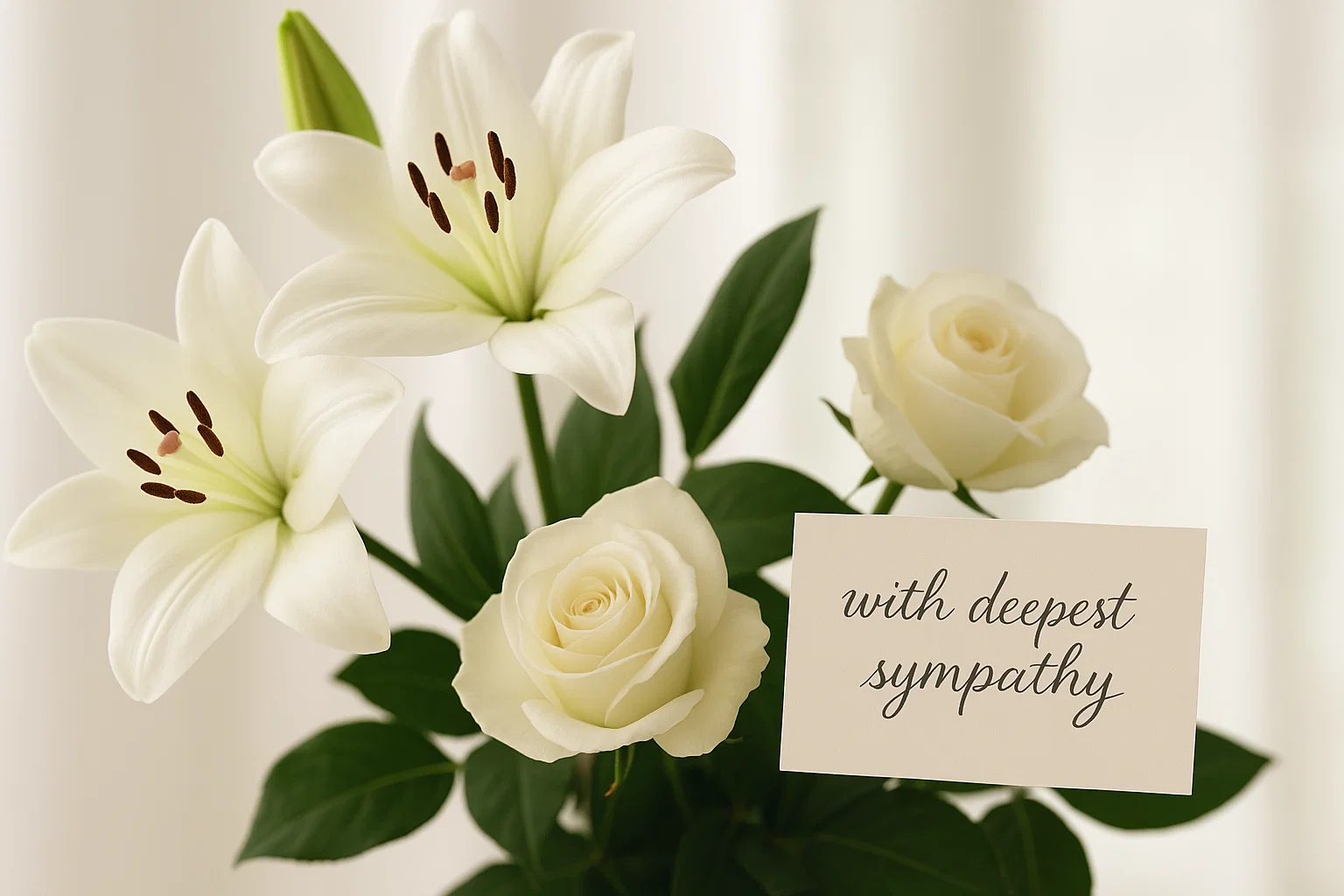Let’s find the right words together.
When Words Feel Hard Let Flowers Speak for You
Flowers have always done what words sometimes can’t. They show up quietly soft, fragrant, full of life and say, “I’m here, I care, and I remember.”
That’s why writing a message for funeral flowers isn’t about perfection. It’s about sincerity.
Whether you’re a family member, a friend, or a work colleague, your words will bring comfort. You’re not just sending petals; you’re sending presence.
Why Messages on Funeral Flowers Matter
Funeral flower messages are small bridges between the living and the departed. They tell the grieving family that love remains, that memories don’t end with loss.
Even a short phrase like “Always in our hearts” or “Gone but never forgotten” can soothe aching hearts. These aren’t empty clichés they’re gentle reminders that someone mattered deeply.
Plus, when the family looks at all the arrangements later, your card becomes part of a quiet, beautiful record of love and remembrance.
Short and Simple Messages
Sometimes, less really is more. If you’re unsure what to write, keep it short and heartfelt. These timeless phrases fit almost any relationship:
- With love and deepest sympathy
- Forever in our hearts
- Thinking of you always
- Rest in peace
- In loving memory
- You will be missed
- Gone too soon, but never forgotten
- With love, from all of us
- Sleep peacefully
A short message feels natural when space is limited on a small card and it can still hold all the emotion you need.
Religious or Spiritual Messages
If faith played a role in the person’s life (or yours), a spiritual touch can add comfort. Here are a few options that honour belief with grace:
- May God hold you in His loving arms
- Rest in the eternal peace of Christ
- In God’s care you rest above
- Heaven has gained another angel
- Peace be with you
- Until we meet again, may God bless and keep you
- The Lord is my shepherd; I shall not want (Psalm 23:1)
These lines work beautifully when the funeral or memorial has a spiritual tone they feel respectful, hopeful, and full of quiet light.
Messages from Family and Close Friends
If you shared a close bond, make it personal. Mention something that reflects who they were kind, strong, funny, radiant or what they meant to you.
- Mum, your love will live in us forever
- To our beloved dad, the best there ever was
- You made every day brighter
- Thank you for every smile, every hug, every memory
- Your laughter will echo in our hearts
- From your grandchildren, with endless love
- Our dearest friend gone, but never forgotten
Don’t worry about sounding “perfect.” The truest messages are often the simplest, spoken as if you were saying goodbye in person.
What to Write When You Didn’t Know Them Personally
Maybe it’s a colleague’s family member, or a friend’s parent you never met. You still want to show respect and care and that matters deeply. Keep your tone gentle and supportive:
- Thinking of you and your family at this sad time
- With deepest sympathy for your loss
- Sending love and strength during this difficult time
- My heart goes out to you and your loved ones
- Wishing you peace and comfort as you remember
- In loving memory of a life well lived
These lines focus on compassion without overstepping. You’re not pretending to know the person you’re acknowledging the grief.
Do You Write the Person’s Name on Funeral Flowers?
Yes but only when it feels appropriate.
If the flowers are going directly to the funeral home or service, it’s common to write the name of the deceased, especially if several arrangements are being delivered.
For example:
“In loving memory of John Harrison from the Smith Family.”
If you’re sending flowers to the family home, you can leave the deceased’s name out and focus on the family instead:
“Thinking of you and your family during this difficult time.”
The rule of thumb? Write what feels most natural given your relationship.
Tips for Writing the Card
Here’s where people often freeze what tone should I use? Should it sound formal? Heartfelt? Poetic?
Relax. Here’s what helps:
1. Keep it honest.
Speak from the heart, not from a Hallmark script.
2. Keep it short.
There’s usually limited space, so focus on meaning, not length.
3. Avoid overused phrases like “everything happens for a reason.” Even if well-meant, they can feel distant to someone grieving.
4. Choose your tone carefully.
If you were close, personal warmth works. If not, kindness and simplicity are best.
5. Sign naturally.
Use first names or family names for example:
- “With love, Emma and Family”
- “From all your friends at the office”
These little touches make your message sound real, not rehearsed.
What to Avoid Saying
Even with the best intentions, some phrases can sting or feel empty in a moment of grief. Try to avoid:
- “They’re in a better place now” (can sound dismissive of pain)
- “Time heals all wounds” (not helpful in fresh grief)
- “At least they lived a long life” (minimises loss)
- “Everything happens for a reason” (can sound insensitive)
Instead, simply acknowledge the sadness: “We’re so sorry for your loss.”
Honesty and compassion always land better than platitudes.
A Final Thought on Saying Goodbye
There’s no perfect sentence that erases pain. But there are words your words that can soften it.
A few honest lines written on a small card can hold memories, gratitude, and love in a way flowers alone never could.
So don’t overthink it. Take a breath. Write what feels true.
Because at the end of the day, it’s not the ink that comforts it’s the heart behind it.

Rachel combines her technical expertise with a flair for clear, accessible writing. A graduate of the University of Edinburgh, she specializes in creating detailed tech-focused content, Govt Jobs, Payslips that educates our readers about the latest in web development and SEO tools at Spinbot blog.

